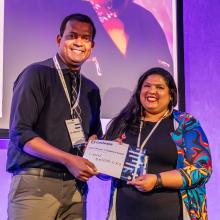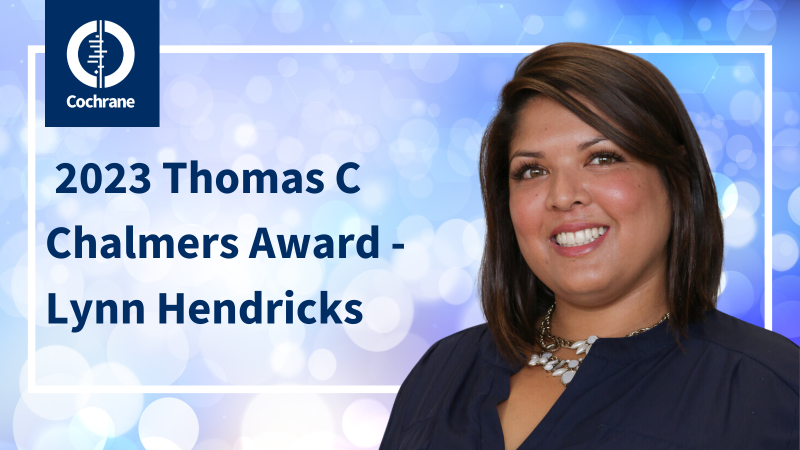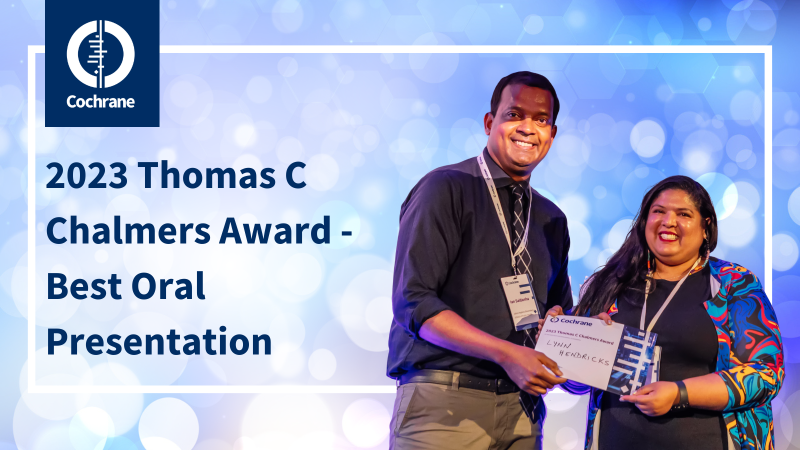
Dr Tom Chalmers was an outspoken advocate of randomised trials, whether at the bedside, at professional meetings, in class or in situations pertaining to his own life. His creativity spanned his entire career, influencing clinicians and methodologists alike. He is perhaps best known for the notion ‘randomise the first patient’, his belief that it is more ethical to randomise patients than to treat them in the absence of good evidence. In his later years, in arguably his most important work, Tom and his colleagues showed that had information from RCTs been systematically and cumulatively synthesised, important treatments such as thrombolytic therapy for myocardial infarction would have been recognised as useful much earlier.
The Thomas C Chalmers Award was initiated by Tom Chalmers himself and further supported with individual donations from friends and family to celebrate and recognise Tom's interests and achievements. The prize is awarded to an early career investigator presenting on methodological issues at the Cochrane Colloquium. The presentations must demonstrate originality of thought, high-quality science, relevance to the advancement of the science of systematic reviews and clarity of presentation.
The Thomas C Chalmers Award for Best Short Oral Presentation goes to Lynn Hendricks, Lecturer, Division of Health Systems and Public Health, Faculty of Medicine and Health Sciences, Stellenbosch University, Cape Town, South Africa.

Lynn won for her short oral presentation called ‘The power of storyboarding as an analytical tool in QES: From review to fieldwork to dissemination.’
Background: Storyboarding in research can be used as a dynamic way to engage in the research process and as a form of data collection. Storyboarding can express a story for both participants and researchers to engage in, and it creates an opportunity between various stakeholders to form a shared language.
Objectives: We aimed to test the utility of the qualitative evidence synthesis (QES) analytical method ‘synthesis by storyboarding’ against the lived experiences of young women living with perinatal infections of HIV (YWLPIHIV).
Methods: As part of a larger study to explore treatment adherence for YWLPHIV, we conducted a QES up to November 2021, which included 47 studies, and synthesized 9 storylines (Hendricks et al. 2022). We analyzed the data using ‘synthesis by storyboarding’. As a second phase, we conducted a primary study. First, we interviewed YWLPHIV about their experiences of their treatment adherence, and then we asked them to edit the QES storyboard to reflect their own lived experiences.
Results: At first, most participants sat in silence, then some had highly emotive responses. We found that each YWLPHIV could relate to elements on the storyboard, including loss of parents, anxiety of disclosure, the emotional rollercoaster of adherence as a teenager, and desire to live without fear of judgement. Even though the storyboard was comprehensive, further detail could be added using their stories.
Conclusions: Storyboarding was found to be a useful analytical method in QES. YWLPHIV found the storyboards to be reflective of their own adherence journeys. This innovative visual synthesis created an opportunity for YWLPHIV to engage in review-level findings, make sense of their own stories, and contribute further insights to the identification of evidence gaps.
Patient, public and/or healthcare consumer involvement: Using storyboarding, the YWLPHIV felt included because they were able to engage in and comment on the review, something they thought impossible at first: “Ek het nooit gedink dat ek die hele ding kan lees nie!” (I never thought I would be able to read this whole thing!). We further used the storyboard as a 1mX1m cloth exhibit on which young women placed their own personal objects that shared their story of adherence for public engagement.

The 2023 Cochrane Colloquium's closing plenary featured the presentation of the award by Ian Saldanha. We interviewed Lynn afterwards to gain insight into her thoughts on the significance of this prestigious recognition.
Can you tell us a little more about what made you decide to enter for the award and the process involved?
When submitting my abstract to the Colloquium, the form asked whether I would like to submit the oral presentation for the Thomas Chalmers award. I went onto the website to look at the eligibility requirements of being an early career researcher and presenting innovative methodological synthesis work, and realised that my work was eligible for consideration. So I happily ticked the box. At the colloquium, I had completely forgotten that I had entered and did not realise that there were guests in my presentation from the awards committee. Only after receiving the award, did I realise the processes that were at play at the colloquium!
What does this award mean you, personally?
This award is particularly special to me because the work was inspired by my desire to make synthesis work accessible to my own community. The Thomas Chalmers Award has given me a chance to reflect on the work and reinforces my commitment to using art and visuals to make synthesis transdisciplinary, accessible, and inclusive. As an emerging researcher from the South, it means a lot to me to know that the global Cochrane community believes in my ideas too.
What’s been the impact to you, and your work, winning the Award?
The acknowledgement from the Cochrane community of the emerging method of storyboarding as synthesis inspires me to continue this trajectory of work. It means that others see the potential of using art and visualisation as a means of synthesising findings. We use visualisations in quantitative research through charts and figures and dissemination through infographics all the time, but in qualitative work, we are still cracking the code. I have always been a methodologist on the primary level and the thought of bringing art to life in the realm of evidence synthesis both excites and challenges me. It is not about the recognition, it is about acknowledging that we are onto something new that others can relate to. I hope that this work inspires more experimentation and innovation using art in the different steps of syntheses.
What would be your message to other colleagues, Cochrane collaborators, who may consider entering for this particular award in the future?
If you are eligible, believe in your work and its potential to inspire others, then tick the box the next time you submit an abstract. The Thomas Chalmers Award offers an opportunity to make a positive impact in your chosen area. It's a chance to celebrate your achievements and inspire excellence.

